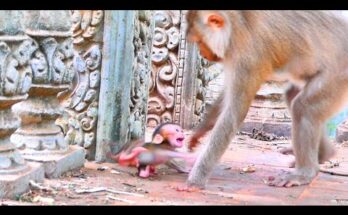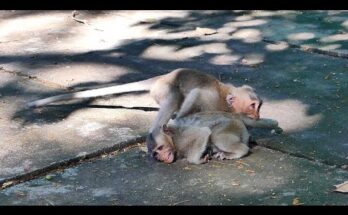In the wild, every new life is a miracle, but for premature baby monkeys, the start of life is often filled with challenges. Unlike full-term infants, premature monkeys are born earlier than expected, leaving them fragile, weak, and extremely thin. Their tiny bodies lack the strength and energy needed to survive on their own. At such a critical stage, the role of the mother monkey becomes absolutely vital. Without her constant attention, warmth, and nourishment, the chances of survival for these delicate infants are very slim.
A premature baby monkey usually shows signs of weakness right from birth. Its body is smaller and thinner than normal, its fur often underdeveloped, and its movements less coordinated. The baby may struggle to hold onto its mother’s fur or even to latch on for milk. These difficulties make it more vulnerable not only to hunger but also to cold weather, falls, and even predators. The early days are the hardest, and this is when the mother’s instincts and care make the biggest difference.
For the mother monkey, caring for a premature baby requires extra patience and dedication. She must hold the baby close at all times, keeping it warm with her own body. Nursing becomes more frequent and gentle, as the baby cannot suckle strongly or for long periods. A good mother will adjust her behavior, ensuring that her fragile infant gets enough nourishment, even if it means stopping her own play or travel to prioritize the baby’s needs.
The emotional bond between mother and child also plays an important role in survival. When a mother grooms her weak baby, she is not only cleaning it but also stimulating blood circulation and comforting it with affection. These small acts of care help the baby feel secure and encourage it to keep fighting for life.
In some monkey troops, other females may even assist by showing support to the inexperienced mother, offering protection or simply staying close. However, most of the responsibility lies in the hands of the mother herself. Her vigilance ensures the baby is not left alone, exposed to dangers, or deprived of food.
The survival of premature baby monkeys is never guaranteed, but with proper maternal care, many can grow stronger over time. Day by day, with enough milk, warmth, and protection, the baby’s body develops muscles, its fur thickens, and its movements become more stable. What starts as a fragile and thin infant can eventually grow into a healthy, playful young monkey if given the chance to thrive.
This story of premature baby monkeys is a reminder of the resilience of life and the power of maternal love. Even in the harsh conditions of the wild, a mother’s dedication can turn weakness into strength. For these fragile infants, the mother’s care is not just important—it is the very key to survival.

